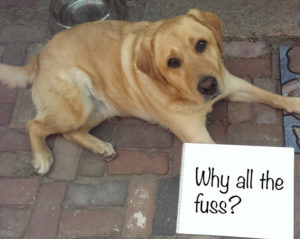POOP HAPPENS, RIGHT?
 True, poop is not exactly an environmental threat on the order of carbon pollution, nuclear waste or a Superfund site. Still, the risk from poop can be more than just a mess on your shoes. Dog waste is an environmental pollutant. The Environmental Protection Agency (EPA) labeled it as a pollutant, placing it in the same category as oil, grease, herbicides, insecticides and other toxic chemicals.
True, poop is not exactly an environmental threat on the order of carbon pollution, nuclear waste or a Superfund site. Still, the risk from poop can be more than just a mess on your shoes. Dog waste is an environmental pollutant. The Environmental Protection Agency (EPA) labeled it as a pollutant, placing it in the same category as oil, grease, herbicides, insecticides and other toxic chemicals.
Not a Fertilizer
Woof-woof waste does not a good fertilizer make. It is actually toxic to your lawn, causing burns and unsightly discoloring. Beyond your own grass, it has been estimated that a single ounce of dog waste can contain 652 million fecal coliform bacteria. EPA even estimates that two or three days’ worth of droppings from an area with about 100 dogs would contribute enough bacteria to temporarily close a bay, and all watershed areas with 20 miles of it, to swimming and shellfishing.
Pet waste pollutes local waters and can be a public health risk!
Dog waste contains disease-causing bacteria that can make people sick. Even worse is the knowledge that dog waste might be polluting our drinking water, local swimming areas and favorite fishing and shellfishing spots. Dog feces are one of the most common carriers of the following diseases: Whipworms, Hookworms, Roundworms, Tapeworms, Parvo, Corona, Giardiasis, Salmonellosis, Cryptosporidiosis and Campylobacteriosis.
Scooping your pet’s waste isn’t just a courtesy for people walking behind you; it also keeps our river and beaches safe.
Clean water is essential for drinking, swimming, fishing and shellfishing. We all need to work together to keep our bay, rivers and beaches healthy. Here’s what you can do to help:
- Always pick up your pet’s waste–even in your own yard.
- Always bring a bag with you when you walk your dog.
- Pick up the pet waste, turn the bag inside out and seal it.
- Place the bag in the trash.
Want to do more to help? Join CPWB, a member supported, not-for-profit organization. CPWB members are heroes for our bay and the backbone of everything that we do as an organization. Together, we can protect Waquoit’s greatest natural resource.
This project is funded by the Massachusetts Environmental Trust. The special environmental license plates are the only specialty plates sold in Massachusetts that exclusively fund environmental programs. The plates are available from the MA Registry of Motor Vehicles.
CPWB Thanks Westport River Watershed Alliance for their permission to redistribute this information.